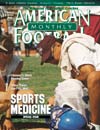AMERICAN FOOTBALL MONTHLY THE #1 RESOURCE FOR FOOTBALL COACHES
Article CategoriesAFM Magazine
|
Behind BowdenFSU Athletic Trainer Randy Oravetz works behind the scenes to keep the Seminoles at the top of the polls© More from this issue With two national titles, 13 years among the top four teams in the country and six Atlantic Coast Conference championships in the 1990s, the Florida State Seminoles have the track record to prove they know what it takes to be a champion. It is that knowledge of the means to reach success that has not only fueled FSU's success on the field, but also it's success in the Don Fauls athletic training facility. Randy Oravetz, the Director of Sports Medicine at FSU, heads up the team behind the Seminoles that has helped keep every FSU squad healthy and on the field. As the primary contact between FSU's medical staff and trainers and FSU coaches, it's Oravetz's job to keep 'Noles athletes healthy enough to keep playing or to help them recover from injuries. "The role of the sports medicine staff here is to prevent at....The full article can only be seen by subscribers.
|
|
|||||||
| HOME |
MAGAZINE |
SUBSCRIBE | ONLINE COLUMNISTS | COACHING VIDEOS |
Copyright 2026, AmericanFootballMonthly.com
All Rights Reserved





